JTA – Earlier this month most of the passengers on a flight from Chisinau, Moldova to Tel Aviv were buried.
Some saw scenes of hardship during a recent tour of war-torn Ukraine by the International Fellowship of Christians and Jews. Others, about 90, were Ukrainians in the process of moving to Israel permanently, talking in muffled voices about being on a plane for the first time, their uncertain future and the loved ones they left behind.
Alexey Shkurat was not subdued.
Bespectacled and bearded, he stood on his seat, performing tricks that made the elderly woman on the seat next to him giggle in spite of herself.
“I love to joke and communicate. It’s my life, why waste it being nervous?” Shakurt told the Jewish Telegraphic Agency.
“And anyway, I’m happy, happy, happy I’ll see my sons again soon,” he added, speaking in English.
Shkurt’s brow furrowed when she spoke Russian and her voice trailed off as she recounted how on February 28, 2022, she risked her life to walk her sons, aged 14 and 12, to the Polish border with their mother and grandmother was put in From there he will go to Israel.
Shakurat could not go with them. The borders were closed to men of military age, so Shkurt was forced to return to his hometown of Odessa. What happened next, as he recalls it, was harrowing: As he walked through an empty field near Lviv, he encountered two Ukrainian soldiers, their AK-74 rifles trained on him. Shakurat raised his hand and asked him to step out of his vehicle. He knew that if he made a single wrong move, he would be shot.
The soldiers searched the car and questioned him, asking him why he was traveling alone after curfew and also asking if he was a Russian spy. Shakurt later learned that 40 Russian paratroopers had recently landed in the area and had stolen ambulances and police cars. He answered the soldiers in Russian, which only increased their suspicions. Ukrainian is the dominant language in western Ukraine, but as a Jew from Odessa, Shakurt’s native language is Russian.
“I was horrified. I know they were only doing their job, but the situation was so dire. Everything I knew in life had changed,” he said.
Luckily, street artist Shakurt was able to prove his identity by showing the soldiers her instagram pageFilled with posts of his art in venues throughout Odessa.
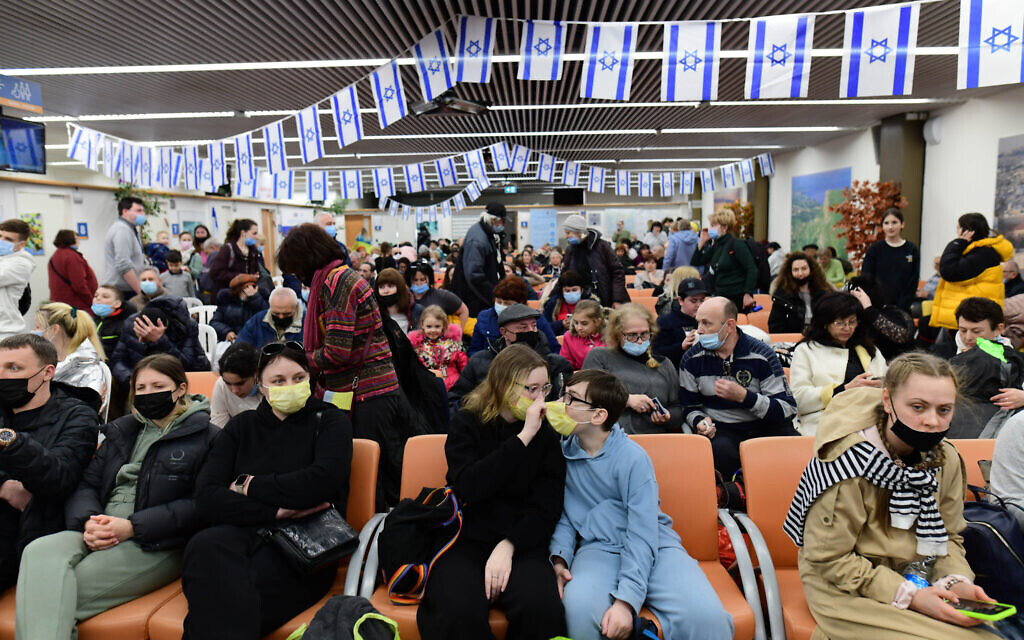
Jewish immigrants fleeing war zones in Ukraine arrive at the Immigration and Absorption Office, at Ben Gurion Airport near Tel Aviv, on March 15, 2022. (Tomer Newberg / Flash90)
But according to Shakurt, the story was not over yet. He said that the next chapter of his life was far more hair-raising. Pressed on details, Shakurat smiled and switched back to English.
“I can’t tell you one thing,” he said. “I want to sell the story to Netflix.”
Whatever cinematic experience Shukurt had, his fellow travelers certainly had stories made up for films of their own. They made it through almost a year of war before deciding to move to Israel, making them the latest of 5,000 new immigrants from Ukraine facilitated by the International Fellowship of Christians and Jews (IFCJ) , working closely with Israeli government organizations such as Nativ. and the Ministry of Aliyah and Absorption. In all, about 15,000 Jewish Ukrainians have immigrated, or made aliyah, in the past year.
According to Gidi Shmerling, vice president of the IFCJ, if there is any upside to the war from Israel’s perspective, it is that many middle-class Ukrainians – doctors, engineers and high-tech workers – who would not otherwise make aliyah are now choosing to do so. .
But the IFCJ’s mandate also includes those Jews who stayed behind. Since Russian tanks first crossed the border a year ago, the group has raised more than $30 million — primarily from evangelical Christians in North America and Korea — including the American Jewish Joint Distribution Committee, or JDC, the main Jewish community in Ukraine. for organizations, and Chabad. (Both groups conduct extensive fundraising of their own.) This week, the anniversary of Russia’s invasion, it announced $4 million in planned spending.
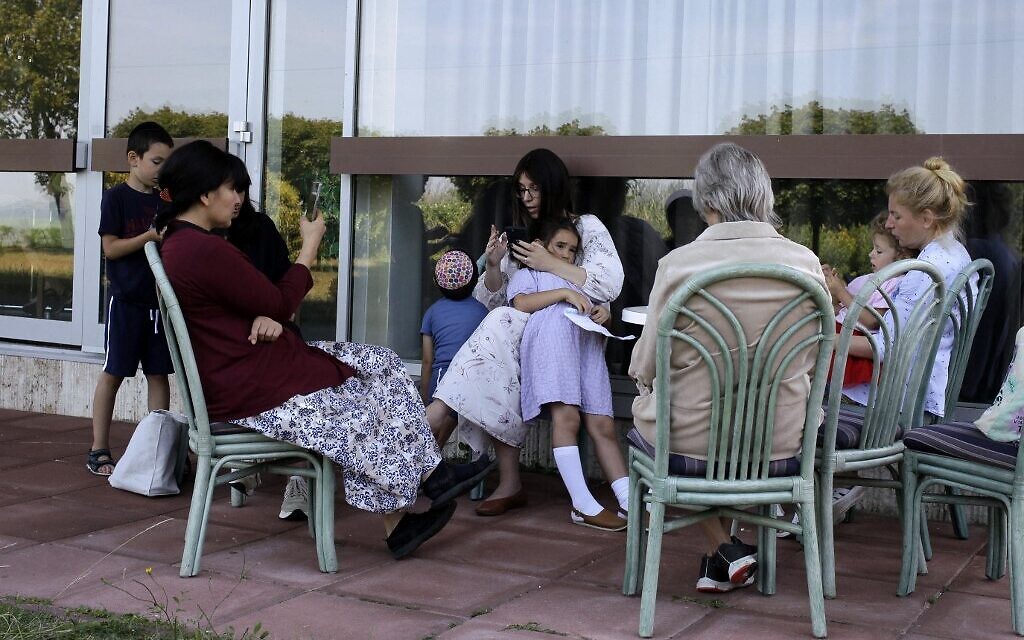
Ukrainian Jewish refugees are seen at a newly opened kosher camp on the southern shore of Lake Balaton in Balatonoszod, Hungary, July 29, 2022. (Peter Kohlmi / AFP)
In Odessa, more than 7,000 people currently receive assistance from IFJC through local Jewish groups. According to the city’s chief rabbi, Avraham Wolff, the once 50,000-strong Jewish community now stands at 20,000. Seven thousand food packets are distributed at Chabad centers every month. Many of the beneficiaries are elderly – some 187 Holocaust survivors among them – but not all. There are several hundred people who have been displaced from nearby towns, such as Mykolaiv, which was hit hard by Russian shells, and some are the so-called new poor, for whom the war has driven them into poverty from loss of income and rising inflation. .
Ala Yaakov Livne, an 86-year-old widow, is one of many people who queued recently to receive a box with oil, flour and other basic necessities. For Livne, the part that stings most about the past year is the sense of betrayal.
,[The Russians] were our neighbors. Many of them were our friends,” she said.
“Times have changed but some things never do,” Livne said. “At that time, we were under the Nazis, at that time, they tried to kill us, and now again, we are under occupation and they are trying to destroy us.”
It was a point that would be repeated many times in the days to come. In a trembling voice, Holocaust survivor Yelena Kuklova, 85, who was hidden in a suitcase in a closet by her non-Jewish neighbors as a child, echoed the sentiment.
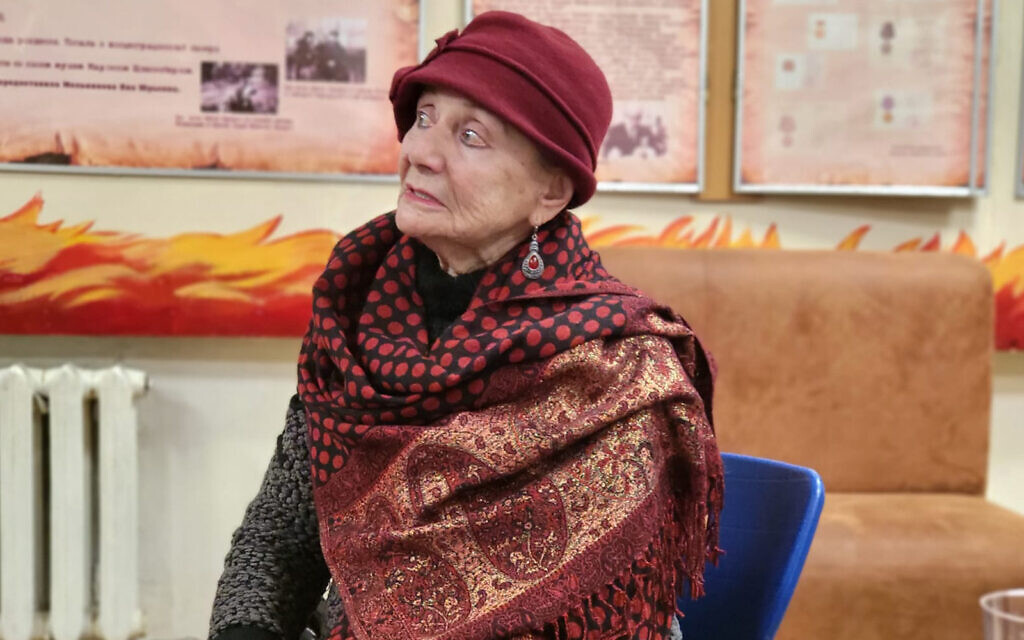
Yelena Kuklova survived the Holocaust by being hidden by non-Jewish neighbors. “We started our lives in war and we are ending them in war,” she said. (Deborah Danan)
“They killed us because we were Jews. They’re killing us today because we’re Ukrainian,” she said, tears rolling down her cheekbones. “We started our lives in war and we’re ending them in war.”
And so it was in war-torn Mykolaiv, 140 kilometers northeast of Odessa. Eli Ben Mendel Hopstein, struck by shrapnel from a Russian missile parked in front of his building, said, “What the Germans could never do, the Russians did.”
Inside his home, Hopstein digs through photos from his decades in the Navy. “I know the danger,” he said, “and I don’t feel it now.” He describes himself as a proud Jew. “First, I’m Jewish, then I’m Ukrainian, and I’ve never hidden it from anyone.”
Mykolaiv, pro-Russian before the war and now a pawn of the south, has become a source of pride for its residents due to Russia’s failure to occupy it. Even before the war, Mykolaiv was an extremely poor city. But now, after eight months of daily explosions, destruction is everywhere and the city’s vital infrastructure has been badly damaged.
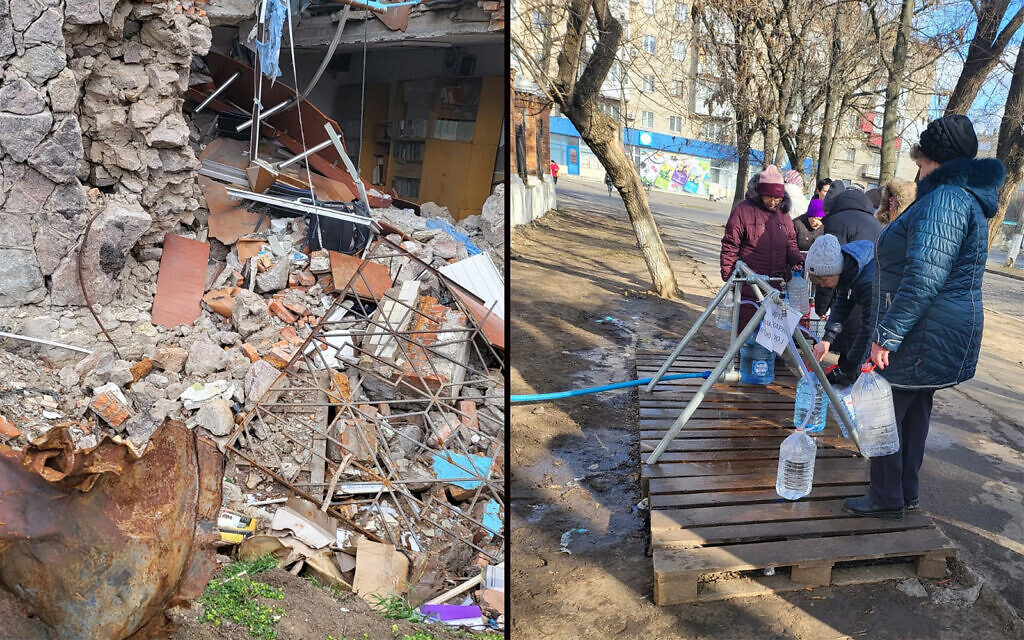
Damaged buildings are a common sight in Mykolaiv, destroyed by Russian troops during the first year of the war. In such a situation, people are queuing up for drinking water. (Deborah Danan)
Like Odessa, the city is without electricity for 22 hours a day. For more than half a year, large areas of the city had no water at all. Today, residents can turn on the tap and get a brownish liquid known as technical water, but it is not potable. For drinking and cooking, they are forced to collect safe water in plastic gallon bottles at water stations throughout the city, many of which were set up by the Israeli non-profit Israelaid.
Sights of people placing buckets outside their homes in the hope of catching rainwater became ubiquitous in Mykolaiv. For its Jewish contingent, Chabad provides truckloads of bottled water. Hopstein credits IFCJ and Chabad for keeping him alive.
“If it wasn’t for their help, I would have nothing,” he said.
Across the street from Hopstein, 82-year-old Galina Petrovna Mirenko, who is not Jewish, is not so lucky. A Russian S300 missile that appeared to be targeting a nearby university missed its mark and struck Mirenko’s home, destroying all of his property. Mironenko said that he gets only one loaf of bread every week from the government. Standing in her lit kitchen, her red-and-blue checkered headscarf offering the only color, Mirenko’s expression is almost childish—a contrast to the words she speaks.
“I’ve died three times in my life,” she said. “Once my father died, second time my son died and third time my house caught fire after 20 minutes.”
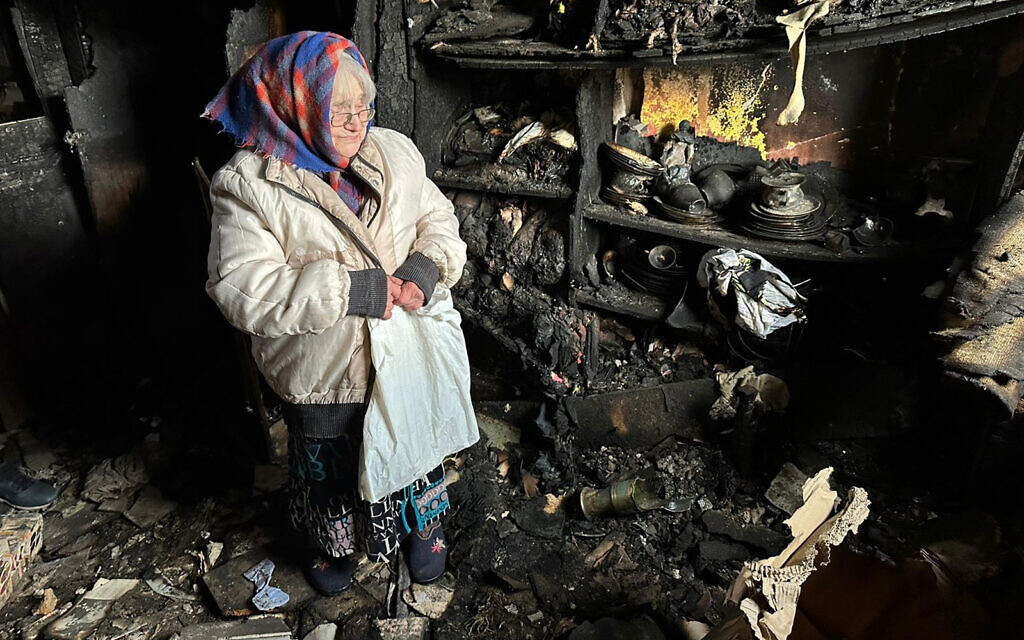
Galina Petrovna Mirenko stands in the rubble of her home destroyed by a Russian missile in Mykolaiv. His Jewish neighbor credits assistance from Jewish organizations for keeping him alive. (Deborah Danan)
Back in Odessa, the sun has set and the city is plunged into darkness, a sign that it will soon be time to head indoors for the nightly curfew. But first, a visit from the Orlikovsky family who are packing their suitcases ahead of their emigration the next day. Four generations of Jews sit on sofas in the small living room: Alina; his daughter, Marina; his grandson Andrey; and Andrey’s wife and daughter Victoria and Sophia.
Andrey recalls February 24, 2022. “I could not believe my eyes and ears. I heard a huge bang and grabbed my daughter and told my wife, ‘Let’s get out!’ I felt my house collapse like a doll house.
But with Victoria’s late mother being ill and, in Andrey’s words, “you get used to the bombs, it would take about a year to finally make the move.”
“We live without electricity, we live without heating, there is often no hot water. We are living like insects, ”said Alina. “My kids told me, Mama, we have to go.”
When the family finished speaking, the power came back on and the lights came on. Sophia, 5, laughed hugging her mother’s chest.
Two weeks after Shukurt, the first anniversary of the war, another 89 new arrivals were welcomed onto the tarmac of Ben Gurion Airport by Israel’s new Immigration Minister, Ofir Sofer. Shakurat is looking for a permanent home where she can sell her art.
“I’m getting to know the country and looking for new friends,” he said. “I want to do a lot of beautiful and bright projects. I want to create a lot,” he said.
He sorely misses Odessa, which he called a wonderful city, but has soothed the pain by being together with his sons.
“Getting together with my kids was the best thing that happened last year,” he said.